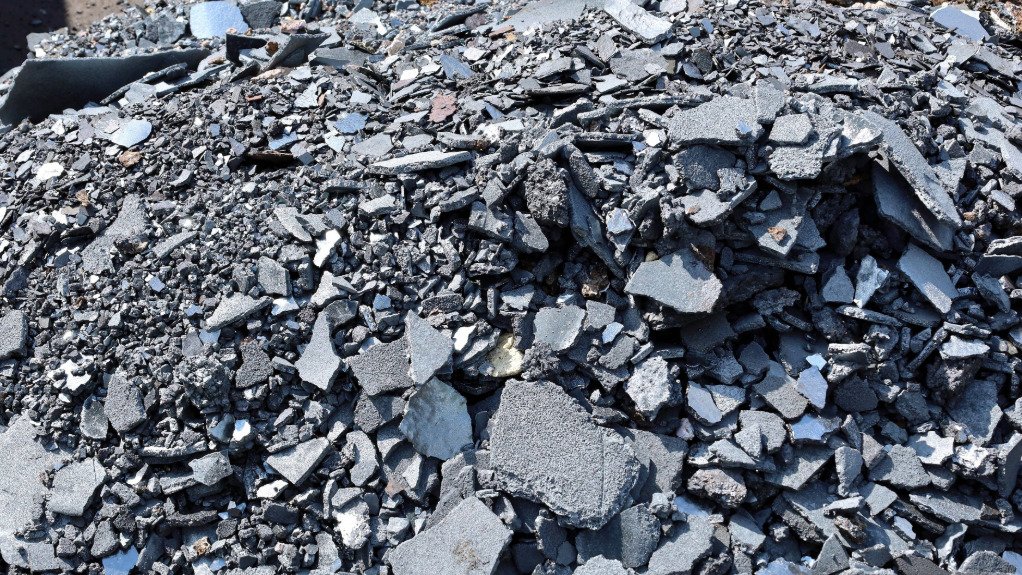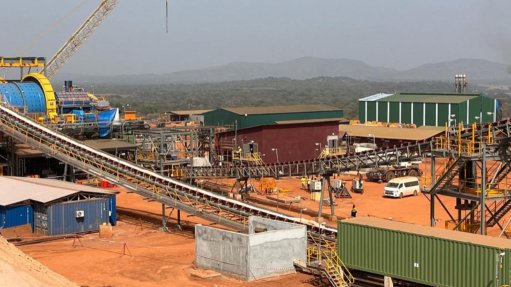By-product paving the way to circularity



VICTOR MANAVHELA Using silicomanganese slag for construction materials offers a waste management solution that can be tailered to each manufacturer
WASTE NO MORE Silicomanganese slag has now been tested and successfully used in a strip of road 2km long, negating its status as a waste material
Reported as an “industry first” in Southern Africa, silicomanganese slag, a by-product of ferromanganese alloy and steel production, has been used as construction material in a 2 km stretch of road in Mpholi township, Manzini, Eswatini.
The silicomanganese slag, sourced by integrated environmental, risk and waste management service provider Tailor-Made Risk Solutions (T-MRS), from its client, in eMalahleni, was used as an aggregate in the road’s construction following a testing and research period last year.
Testing of the slag was undertaken by national industry support programme, the National Cleaner Production Centre of South Africa (NCPC-SA), hosted within the Council for Scientific and Industrial Research.
The NCPC-SA worked with T-MRS as part of the Gauteng Industrial Symbiosis Programme, to provide a comprehensive strategy that focuses on mitigating environmental impacts through sustainable use and disposal practices.
The programme also aims to foster innovation and collaboration across industries to unlock the potential value of slag as a backup resource in the emerging circular economy.
“This initiative presents opportunities for cost savings and potential profit generation for the company,” says NCPC-SA national programme manager Victor Manavhela.
T-MRS identified a silicomanganese slag stockpile of 6.6-million tons on a steel manufacturing client’s site. The stockpile posed considerable environmental, economic and regulatory risks, and T-MRS observed that it could, through the programme, potentially convert this liability into circular economy opportunities.
Despite its abundant generation, the proper management and use of slag remain underdeveloped, leading to significant disposal burdens and missed opportunities for resource recovery and circularity.
“This led to T-MRS’s approaching the NCPC for technical assistance to establish if the slag could be repurposed for construction applications,” adds Manavhela.
The samples attained from the client were then tested for a month at a civil engineering materials testing facility in Germiston, Gauteng, which assessed the particle-size distribution of the slag, ensuring that it aligned with the requirements for aggregate use in concrete and road construction layers.
The laboratory reported that the slag maintained robust load-bearing capacity and met or surpassed the necessary standards required for its proposed use.
Manavhela notes that these results “suggest that the slag can effectively withstand traffic loads in road construction scenarios”.
The report also indicated that the “comprehensive data gathered underscores the favourable strength properties of the slag, positioning it as a viable construction material when appropriately compacted and managed for moisture content”.
“The use of silicomanganese slag in road construction offers various benefits over conventional materials – some of those benefits are skid resistance, great compressive strengths, [as well as heat and erosion resistance],” says T-MRS CEO Brave Leballo.
Future Slag Potential
“Based on the studies conducted, tests done and practical application of slag, I am of a firm belief that steel slag is an effective and sustainable substitute for natural aggregates. The use of steel slag in road construction paves the way for practical waste use and reduced overreliance on cyclical regular methods,” adds Leballo.
Although the slag is used as an aggregate concrete and road construction layer, it can also be used in the manufacture of concrete bricks, pipes and pavers, says Manavhela.
A challenge facing manufacturers and producers is that silicomanganese slag is generated from various disparate processes that depend on numerous different input materials. This means that the type of slag needs to be studied on an individual or site-by-site basis to ascertain its suitability as a construction material.
To this end, engagement with producers and further development of the concept is crucial to the slag being allocated a defined role in the circular economy.
Manavhela says fostering collaboration with industry stakeholders, including cement manufacturers and road construction companies, is essential to raise awareness about the benefits of integrating slag into their processes.
By showcasing its efficacy and environmental advantages, partnerships can be formed to promote the widespread adoption of slag in a range of construction materials.
Additionally, proactive engagement with regulatory bodies is essential to ensure adherence to applicable standards and regulations governing the use of industrial by-products in construction.
“This active involvement will help create guidelines for the safe and responsible reuse of slag, which, in turn, will build trust among all stakeholders and will encourage its use in future construction projects,” he concludes.
Article Enquiry
Email Article
Save Article
Feedback
To advertise email advertising@creamermedia.co.za or click here
Announcements
What's On
Subscribe to improve your user experience...
Option 1 (equivalent of R125 a month):
Receive a weekly copy of Creamer Media's Engineering News & Mining Weekly magazine
(print copy for those in South Africa and e-magazine for those outside of South Africa)
Receive daily email newsletters
Access to full search results
Access archive of magazine back copies
Access to Projects in Progress
Access to ONE Research Report of your choice in PDF format
Option 2 (equivalent of R375 a month):
All benefits from Option 1
PLUS
Access to Creamer Media's Research Channel Africa for ALL Research Reports, in PDF format, on various industrial and mining sectors
including Electricity; Water; Energy Transition; Hydrogen; Roads, Rail and Ports; Coal; Gold; Platinum; Battery Metals; etc.
Already a subscriber?
Forgotten your password?
Receive weekly copy of Creamer Media's Engineering News & Mining Weekly magazine (print copy for those in South Africa and e-magazine for those outside of South Africa)
➕
Recieve daily email newsletters
➕
Access to full search results
➕
Access archive of magazine back copies
➕
Access to Projects in Progress
➕
Access to ONE Research Report of your choice in PDF format
RESEARCH CHANNEL AFRICA
R4500 (equivalent of R375 a month)
SUBSCRIBEAll benefits from Option 1
➕
Access to Creamer Media's Research Channel Africa for ALL Research Reports on various industrial and mining sectors, in PDF format, including on:
Electricity
➕
Water
➕
Energy Transition
➕
Hydrogen
➕
Roads, Rail and Ports
➕
Coal
➕
Gold
➕
Platinum
➕
Battery Metals
➕
etc.
Receive all benefits from Option 1 or Option 2 delivered to numerous people at your company
➕
Multiple User names and Passwords for simultaneous log-ins
➕
Intranet integration access to all in your organisation



















